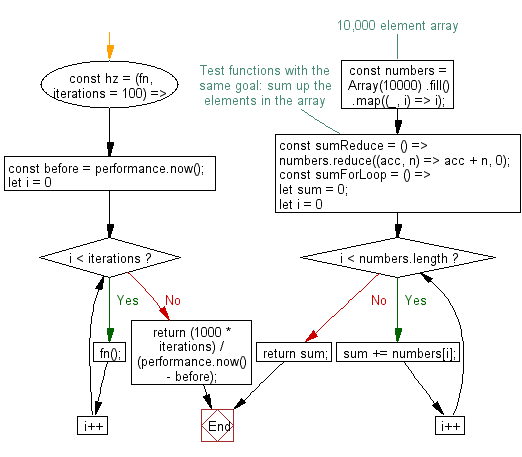JavaScript: Get the number of times a function executed per second
JavaScript fundamental (ES6 Syntax): Exercise-218 with Solution
Function Execution Frequency (Hz)
Write a JavaScript program to get the number of times a function executed per second. HZ is the unit for hertz, the unit of frequency defined as one cycle per second.
- Use performance.now() to get the difference in milliseconds before and after the iteration loop to calculate the time elapsed executing the function iterations times.
- Return the number of cycles per second by converting milliseconds to seconds and dividing it by the time elapsed.
- Omit the second argument, iterations, to use the default of 100 iterations.
Sample Solution:
JavaScript Code:
// Define a function 'hz' to measure the performance (in Hertz) of a given function by running it for a specified number of iterations
const hz = (fn, iterations = 100) => {
// Record the current timestamp before executing the function
const before = performance.now();
// Execute the function 'iterations' times
for (let i = 0; i < iterations; i++) fn();
// Calculate the Hertz value by dividing the total number of iterations by the time taken to execute the function
return (1000 * iterations) / (performance.now() - before);
};
// Create an array 'numbers' containing 10,000 elements
const numbers = Array(10000)
.fill()
.map((_, i) => i);
// Define two functions 'sumReduce' and 'sumForLoop' to sum up the elements in the 'numbers' array using different methods
const sumReduce = () => numbers.reduce((acc, n) => acc + n, 0);
const sumForLoop = () => {
let sum = 0;
for (let i = 0; i < numbers.length; i++) sum += numbers[i];
return sum;
};
// Compare the performance of 'sumReduce' and 'sumForLoop' by measuring their Hertz values
// 'sumForLoop' is nearly 10 times faster than 'sumReduce'
console.log(Math.round(hz(sumReduce)));
console.log(Math.round(hz(sumForLoop)));
Output:
3584 2688
Flowchart:

Live Demo:
See the Pen javascript-fundamental-exercise-218 by w3resource (@w3resource) on CodePen.
For more Practice: Solve these Related Problems:
- Write a JavaScript program that measures how many times a function can be executed per second using performance.now().
- Write a JavaScript function that benchmarks a given callback function to determine its execution frequency (Hz).
- Write a JavaScript program that runs a loop for a second and counts the iterations of a specific function call.
- Write a JavaScript function that reports the hertz (cycles per second) of a provided function under load.
Go to:
PREV : Number in Range.
NEXT : Hamming Distance.
Improve this sample solution and post your code through Disqus
What is the difficulty level of this exercise?
Test your Programming skills with w3resource's quiz.
